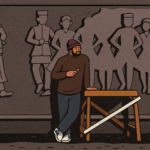Leo Tolstoy: Forging a Legacy of Love, Truth, and Conscience
A Crisis That Became an Awakening
In the quiet halls of Yasnaya Polyana, Leo Tolstoy wrestled with despair. By the late 1870s, he had written War and Peace and Anna Karenina—novels that secured him global fame. And yet, he felt hollow. Despite fortune and glory, he stared into the abyss of mortality. What is the meaning of life if death erases everything?
This crisis, however, was not the end. Rather, it became the spark for the Leo Tolstoy legacy we know today. From despair came epiphanies that transformed him from aristocrat to seeker of truth, from novelist to moral philosopher, and from writer to luminary whose ideas still inspire the world.
The Early Fires: War, Chaos, and Creation
Tolstoy’s legacy began in conflict. Born in 1828 into Russian aristocracy, he enjoyed privilege but faced deep inner unrest. Moreover, as a soldier in the Crimean War, he saw lives shattered on battlefields. Those experiences scarred him but also seeded his genius.
Out of this crucible came War and Peace (1869), a sweeping epic that explored history, fate, and the fragility of life. In addition, with Anna Karenina (1877), he turned inward, revealing the complexities of love, betrayal, and conscience. These novels alone would have secured his immortality. Yet they were only the foundation for the enduring Leo Tolstoy legacy of literature.
Epiphanies of the Later Years
The real forging of Tolstoy’s timeless legacy began after fame. In middle age, he abandoned the luxuries of nobility and embraced simplicity. Consequently, his works shifted in focus from social grandeur to moral clarity.
For instance, The Death of Ivan Ilyich (1886) was a searing meditation on mortality and truth. Resurrection (1899) exposed injustice and institutional hypocrisy. Most profoundly, in The Kingdom of God Is Within You, he defined a philosophy of non-violence, compassion, and moral courage. Therefore, these writings reshaped his reputation, creating a Leo Tolstoy legacy of conscience that extended far beyond Russia.
A Luminary Beyond Borders
Tolstoy’s influence did not stop at literature. Instead, it reached across continents. Mahatma Gandhi, deeply moved by Tolstoy’s essays on non-violence, carried his principles into India’s struggle for freedom (Britannica – Leo Tolstoy and Gandhi). Likewise, Martin Luther King Jr. echoed these principles in the American civil rights movement.
Meanwhile, his Yasnaya Polyana estate became a hub for education, where he taught peasants and tested new methods of learning. In this way, the Leo Tolstoy legacy was not confined to books—it expanded into life itself.
Why Tolstoy Endures
Tolstoy endures because his questions remain alive. He dared to confront despair, mortality, love, and justice with honesty. Furthermore, his novels continue to speak to the soul, while his philosophy continues to challenge the conscience.
When readers open War and Peace or Anna Karenina, they encounter more than characters—they find reflections of themselves, proof of literature’s power to awaken love and empathy. Similarly, when leaders read The Kingdom of God Is Within You, they encounter not just philosophy but a blueprint for action. As a result, the Leo Tolstoy legacy still shapes hearts and societies alike.
The Epiphany That Lives On
Tolstoy once wrote: “Everyone thinks of changing the world, but no one thinks of changing himself.” This truth captures his life. Through despair, he found clarity. Through privilege, he embraced simplicity. Through art, he sought truth.
In doing so, he forged a legacy of love, truth, and conscience—one that continues to guide a world still searching for meaning. Finally, more than a century after his death, Tolstoy reminds us that the most powerful transformations begin within.
Also Read:
Devvrat Vishwakarma: Transforming Shimla into a Street Art Museum



Zubeen Garg: The Unmatched Legacy of a Voice That Sang, Soared, and Stood for Justice - BlogOpine
5 months ago[…] Opinion […]